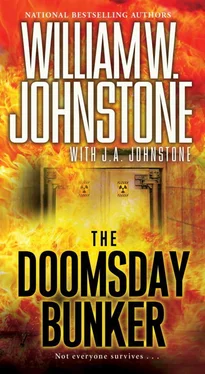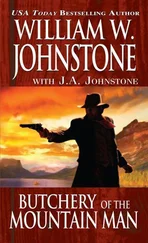“It takes a while, doesn’t it?” he said as he struggled with some with the technique.
“That’s why you have multiple magazines and keep them loaded. You can switch them out and release the slide in a second or so.”
“Maybe you can.”
“You’ll get it,” she said.
“You think so? Is it really so important that I can do this?”
“Well, if you never need to, you haven’t lost anything except some time.”
“And maybe part of my hearing,” he muttered.
“But if it ever comes down to you being able to shoot in order for you to save your life… or to save the lives of me and the kids… wouldn’t it be better for you to know what you’re doing?”
He looked at her for a long moment, then started to slide the loaded magazine into the pistol’s grip.
“Finger away from the trigger first,” she reminded him. “Finger never goes in until you’re ready to shoot.”
“Now you’re just talking dirty.”
“Slide that on in there, big boy,” she told him, “and let’s go.”
* * *
Larkin had grown accustomed to writing the checks to the Hercules Project. He still winced at the amounts, but just like the mortgage on their house, they were paying off the debt in big chunks and would have it off their back sooner, saving money in the process. It was the prudent way to handle things. Of course, thrift was no longer in fashion, starting right at the top with a government that spent money in mind-boggling amounts, faster than seemed humanly possible.
The work of finishing the Hercules Project had continued. Several times, Graham Moultrie had invited the people who had signed up as residents to come out and take a look at what had been done. Larkin had to give him credit for transparency. He had never really warmed up to Moultrie, but the guy seemed to be genuinely devoted to what he was doing.
Moultrie had made his money in commercial real estate, Larkin had discovered through doing some online research into the man’s background, so this was hardly the first big project he had tackled. It was maybe the biggest and most important, though. Building a shopping center didn’t really compare to the survival of the human race.
Those visits to the project had given Larkin and Susan the chance to meet some of the others who would be there in case of an emergency. Larkin was glad to see that his old friend and fellow Marine Adam Threadgill was among them, along with Threadgill’s wife Luisa, their daughter Sophie, and Sophie’s husband Jack. If it ever came down to something bad enough to need the refuge, it would be good to have friends there.
In the meantime, life went on, including mowing the lawn, and Larkin was doing that when his next-door neighbor Jim Huddleston pulled into the driveway separating their yards. The door on the Huddleston garage started rolling up, but Huddleston stopped his car in the driveway and got out.
Huddleston waved and looked like he wanted to talk, so Larkin cut the engine on the lawn mower. Huddleston’s wife Beth hated that lawn mower, claiming that it was not only noisy but produced an incredible amount of pollution. Larkin had tried to explain to her more than once that he kept the engine tuned up so it worked efficiently, but she drove one of those tiny electric cars, so there really wasn’t any reasoning with her. He hoped Huddleston wasn’t about to scold him for using the mower. That seemed unlikely. Huddleston tolerated his wife’s opinions but had never come across as passionately devoted to them.
“How long have you been out here mowing, Patrick?” Huddleston asked as he walked over.
Maybe he was wrong, Larkin thought. Maybe his neighbor was going to gripe at him after all.
“Fifteen, twenty minutes is all,” Larkin said. “I’m almost done.”
“Then you haven’t heard.” Huddleston scrubbed a hand over his face and looked tired. “I’d just left one of the stores when there was a news bulletin on the radio.”
Huddleston owned a regional chain of pizza restaurants, one of which was close by and was the “store” he referred to, Larkin knew. He was about Larkin’s age, with a brush of sandy hair and the still handsome face of an aging frat boy. Larkin liked him well enough. They’d been to barbecues at each other’s houses, drank beer together, gone to the same Super Bowl parties. It was a typical suburban friendship, more of a casual but extensive acquaintance than anything else.
“News bulletins these days are never good,” Larkin said.
“There’s been another terror attack. Somebody crashed a light plane filled with explosives into the stands at a college football game in Michigan.”
Larkin took a deep breath as his jaw tightened. “Good Lord,” he said. “I’m sure there were fatalities.”
“More than a hundred so far, they said on the radio. Could go as high as a thousand, people are speculating.”
“What the hell is wrong with those bastards?” Larkin burst out. “What are they trying to accomplish?”
“They’re trying to scare us,” Huddleston said. “And they’re succeeding. Any time, anywhere I’m around a crowd these days, I worry that something’s going to happen. Whether it’s a crazy terrorist or a kid who’s had his mind messed up by ADHD drugs and video games, it seems there’s always somebody out there who wants to hurt innocent people.”
“Yeah, it sure seems like it,” Larkin said. “But hell, you can’t just curl up in a little bubble and stay there. You’ve got to keep on living your life.”
“I know. But then you think about the Russians and the North Koreans and the Iranians, and you never know what they’re going to do, and I tell you, it just…” Huddleston shook his head, unable to find the words. “Sometimes I just want to give up and go crawl in a hole, that’s all.”
The irony of what they had both just said hit Larkin hard. Was that what he and Susan were doing by their involvement with the Hercules Project? Giving up and crawling into a hole?
No, he told himself. It wasn’t the same thing at all. The project was a last-ditch option, never to be used unless the shit really did hit the fan. It wasn’t like they would be going down there just in case something happened. Disaster would have to be imminent.
The place wasn’t a damn resort, after all.
But when he looked at Huddleston, a thought suddenly hit him. He hadn’t said one word to the man about the Hercules Project. Huddleston probably didn’t even know about it. Graham Moultrie had mentioned that he was relying on word of mouth to inform people, because he wanted to have some control over who applied for residence there. As Moultrie had pointed out, there had to be balance as far as skills and occupations went in order for the community to function.
Huddleston was a good guy, though, competent and dedicated enough to be quite successful in the difficult restaurant business, and his wife Beth, though annoying in some of her opinions, was an experienced elementary school teacher. They were going to need teachers in the Hercules Project, Larkin recalled Moultrie saying, and probably Huddleston would be good at whatever job they gave him. He could always cook pizza, if nothing else, Larkin thought.
All that went through his mind in a second while Huddleston was still standing there shaking his head gloomily over the latest terrible news. Larkin reached out, put a hand on his neighbor’s shoulder, and said, “Listen, Jim, there’s a place I want to tell you about…”
October 5
“What a horrible thing,” Beth Huddleston said with an expression of revulsion on her face. “Jim, you can’t be serious about actually taking part in such madness.”
Читать дальше









